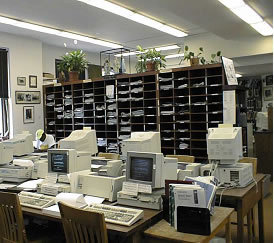By
Jim Ashmore
Every day from the time we wake up until the time we go to
bed, we are bombarded with
information from all sides, from TV, radio, newspapers and books;
from family, friends, and colleagues.
As a new cable television
subscriber, I am absolutely
amazed at the quantity and varying levels of information quality
on cable television. Including the networks, there are eight
TV "news" organizations
vying to provide us with all the information we can possibly
absorb. Newspapers, magazines,
books, radio, the internet, email, snail mail, the telephone
all compete for our attention
and our minds. At the office conversations around the water
cooler and coffee maker serve
to spread even more items of information. 
There is valuable information out there about the world we live in, on topics
as varied as health, safety, traffic, nutrition,
business, finance, philosophy,
nature, science, weather, history and the human condition.
There is also a large amount of misleading
and outright false information,
not just on controversial subjects such as politics and religion
but on any topic one can think of, including all of the topics
mentioned above. 
With all this information coming to us from all directions,
how does one sift through it all to sort out the facts from
the fiction, the
truth from the lies, the more important from the less important?
Should we turn off the TV, cancel our newspaper subscriptions,
disconnect our phones
and modems
to become information "hermits"?
Probably not. 
 A
better method of sifting through the information wave without
being overwhelmed
and confused is to become a skeptical inquirer
-or skeptic --- with regard to the surrounding
world. By "skeptic" I do not mean a cynic
- a person who rejects new ideas simply because they are new.
A skeptic is one who questions the validity
of a particular claim by calling for evidence
to prove or disprove it. Skepticism
is a method, not a position. It is a provisional
approach to all factual claims. In terms of processing
information, a skeptic needs to be able to grasp
reality and acquire knowledge about the environment that agrees
with reason, logic,
and evidence. In other words, as skeptics, when we hear a
claim that may or may not be fantastic,
we should say, "That's nice, prove it." A
better method of sifting through the information wave without
being overwhelmed
and confused is to become a skeptical inquirer
-or skeptic --- with regard to the surrounding
world. By "skeptic" I do not mean a cynic
- a person who rejects new ideas simply because they are new.
A skeptic is one who questions the validity
of a particular claim by calling for evidence
to prove or disprove it. Skepticism
is a method, not a position. It is a provisional
approach to all factual claims. In terms of processing
information, a skeptic needs to be able to grasp
reality and acquire knowledge about the environment that agrees
with reason, logic,
and evidence. In other words, as skeptics, when we hear a
claim that may or may not be fantastic,
we should say, "That's nice, prove it." 
|